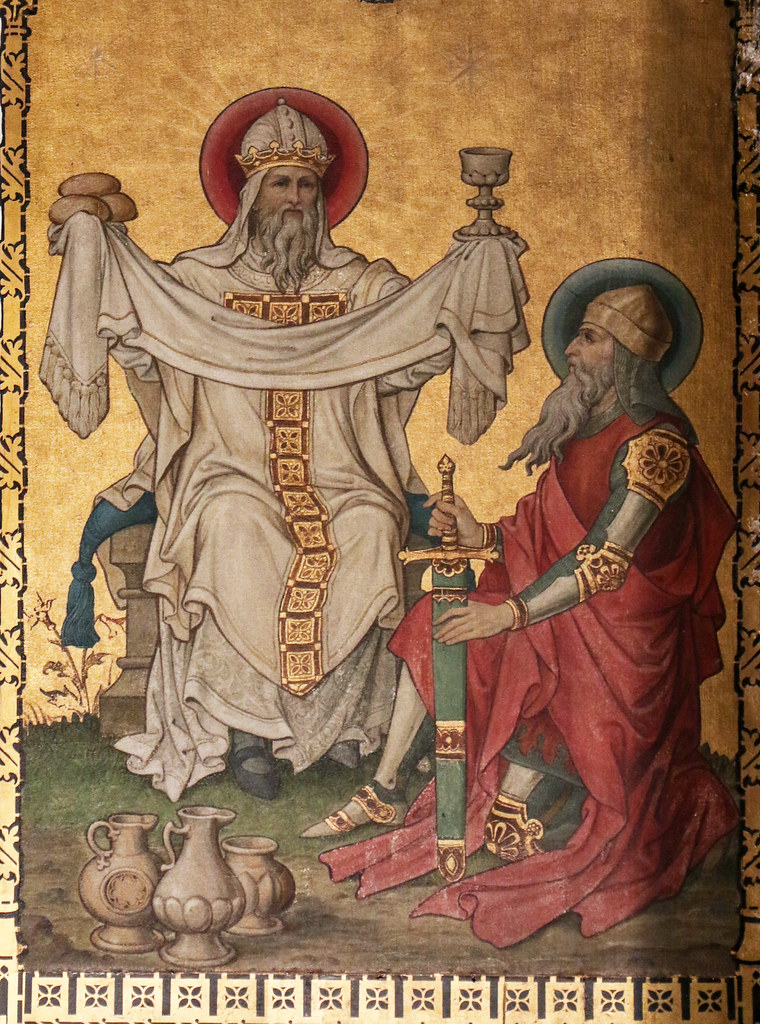In the Genesis a figure emerges who belongs to no line of fathers and no order of blood. His name is Melchizedek, king of Salem and priest of the Most High. He comes without genealogy, without beginning or end, without the bonds of tribe or descent. He reigns in a city that is less a place than a symbol, since Salem is peace, wholeness, the meeting of heaven and earth. When he enters the story of Abraham it is through blessing, bearing in his hands bread and wine.
In that simple gesture lies the first sacrament, the union of body and Spirit in a ritual that precedes the Law and exceeds history. Centuries later this gesture will echo in the Last Supper, and still later in Amália Rodrigues’s Uma Casa Portuguesa: the same bread and wine upon the table of everyday life. The mystery of Salem is renewed in the ordinary.
I. The King beyond Genealogy
Melchizedek appears in Genesis 14 like a visitor from outside time. The narrative of Abraham is filled with names of kings, nations, victories and spoils. But Melchizedek is different, without father or mother recorded, without descent. Later the Psalmist proclaims, “Thou art a priest forever after the order of Melchizedek” (Psalm 110:4), and the Epistle to the Hebrews seizes on this mystery, seeing in him a type of Christ, one who transcends the limits of Levitical succession.

He reigns in Salem, which tradition ties to Jerusalem, yet he reigns in a Salem higher than geography, a city that exists in the invisible, a realm of peace before war, harmony before division. To speak of Melchizedek is to address kingship not bound by conquest nor by inheritance. His reign is sacramental. His power is exercised the act of blessing. In this he reveals a pattern that Christ fulfils, with the Word and the gift of himself.
II. Bread and Wine as Body and Spirit
The gesture that defines Melchizedek is the bringing forth of bread and wine to Abraham. They are elemental signs, the two poles of human sustenance and Divine mystery. Bread is the body of the earth transformed by fire, the grain gathered, crushed, kneaded, and baked. It is the substance of labour, the ground of life, the image of body and form. Wine is the blood of the vine, born of hidden fermentation, the fruit pressed until it yields a new essence, the image of Spirit, joy, and inward fire.
When bread and wine meet in the same offering, they speak of the union of visible and invisible, flesh and breath, matter and soul. Melchizedek never sacrifices animals; he offers elements that speak of the inner structure of reality. It is a priesthood of correspondence, where what is below mirrors what is above, and what is above breathes through what is below. Centuries later Christ will take bread and wine and declare them His body and blood, not as innovation but as fulfilment of the ancient act of Salem. The mystery is continuous. That which Melchizedek enacted in shadow becomes Light in the upper room.
III. The Daily Table as Altar
The power of the symbol remains beyond Scripture. It crosses into the daily life of a people, becoming flesh in their songs and customs. In the voice of Amália Rodrigues, the same truth is heard. She sang in Uma Casa Portuguesa:
“Numa casa portuguesa fica bem
Pão e vinho sobre a mesa.”
“In a Portuguese house it is fitting
Bread and wine upon the table.”
She did not speak in the lexicon of theology, but her words carried the same sacrament. The table of the household, the table of the family, the table where bread and wine are shared become an altar where body and Spirit meet. The humble gesture of placing bread on the cloth and pouring wine into a glass is a silent rite.
It is the same union of earth and heaven, only in a domestic note. The Emerald Tablet teaches that what is above is reflected in what is below; Amália does it through song, showing that the kitchen table mirrors the altar of the cosmos. The Divine enters the ordinary through presence and simplicity rather than only splendour. In this lies the secret of the hermetic vision: the world is revealed in the act of correspondence. When bread and wine are honoured, even without words, they recall the blessing of Melchizedek, they recall the eternal priesthood that unites flesh and spirit. The king of Salem reigns wherever the table is laid, since the true Salem is peace, and peace is communion.
Fiat Lux.
